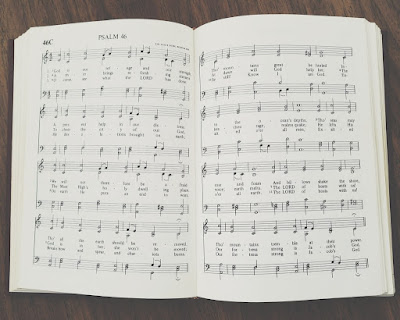Do you teach scripture memorization to your children? For many kids, memorization comes relatively easily. Something to do with young brain matter, I guess. When our kids were younger, we incorporated scripture memorization on a daily basis. One year, they learned almost the entire book of James by memory. That was a big accomplishment, for sure.
But memorization can by challenging. Whether it's scripture, times tables, or a foreign language, there are tools that can help facts and words 'stick' to our brains. We use copywork, pictures, rote repetitions, and song.
The church I grew up in exclusively used the psalms for worship. We had a book called a psalter, and all 150 psalms were in there by number, each set to music and meter. We sang these a cappella too.
Singing these each Sunday helped me develop music reading skills, rhythm, and my singing voice. But more importantly, singing God's word each week helped me commit much of it to memory.
Copyright 1973, by The Board of Education and Publication, Reformed Presbyterian Church of North America
Even today, though it's been 20 years since I regularly attended a psalm-singing church, I still know many of the words of the psalms by heart. And I am so thankful for that.
There are several reasons why it makes sense to utilize psalm singing to memorize scripture:
- Music is known to be a powerful memory retention tool.
- The psalms were written to be sung in worship to God, not just read.
- Singing in rhyme helps boost levels of acetylcholine, which is associated with memory.
- Many psalms are short, which means even young children can memorize them.
- Studying the psalms is a wonderful way to combine lessons in bible, literature, history, and music.
- Singing psalms together in family worship time is a blessing
- When kids sing the same songs repeatedly, they memorize without realizing their brain is retaining the words.
Psalm 46
God is our refuge and strength,
an ever-present help in trouble.
2 Therefore we will not fear, though the earth give way
and the mountains fall into the heart of the sea,
3 though its waters roar and foam
and the mountains quake with their surging.[c]
an ever-present help in trouble.
2 Therefore we will not fear, though the earth give way
and the mountains fall into the heart of the sea,
3 though its waters roar and foam
and the mountains quake with their surging.[c]
4 There is a river whose streams make glad the city of God,
the holy place where the Most High dwells.
5 God is within her, she will not fall;
God will help her at break of day.
6 Nations are in uproar, kingdoms fall;
he lifts his voice, the earth melts.
the holy place where the Most High dwells.
5 God is within her, she will not fall;
God will help her at break of day.
6 Nations are in uproar, kingdoms fall;
he lifts his voice, the earth melts.
7 The Lord Almighty is with us;
the God of Jacob is our fortress.
the God of Jacob is our fortress.
8 Come and see what the Lord has done,
the desolations he has brought on the earth.
9 He makes wars cease
to the ends of the earth.
He breaks the bow and shatters the spear;
he burns the shields[d] with fire.
10 He says, “Be still, and know that I am God;
I will be exalted among the nations,
I will be exalted in the earth.”
the desolations he has brought on the earth.
9 He makes wars cease
to the ends of the earth.
He breaks the bow and shatters the spear;
he burns the shields[d] with fire.
10 He says, “Be still, and know that I am God;
I will be exalted among the nations,
I will be exalted in the earth.”
11 The Lord Almighty is with us;
the God of Jacob is our fortress.
the God of Jacob is our fortress.
.
Now, let's see it set to music.
You can purchase an psalter, or psalm book of your own. Different versions are available and can be purchased here.
You can see that some of the words have been altered for the sake of rhyme, the meaning is unchanged.
By having the music, your child can learn this psalm on piano too, to learn the tune. Many of the psalms contained in a psalter will have familiar hymn tunes that will help with reading the music as well. This is also a fun addition to family worship time. Children love to sing, and what could be better than singing God's own words back to Him?
Singing scripture is such a useful and enjoyable way to hide God's word in our hearts. And singing the psalms, which were always meant to be sung is one simple and effective way to memorize.
What helpful tools do YOU use to memorize scripture?

